The Hidden Cost of Cyber Neglect: What Clients Really Think About Law Firms, Cybersecurity, and AI
A survey among 750 current US law firm clients reveals challenges and opportunities facing law firms when it comes to technology
The Future of Law Firms Lies in the Tech They Ignore
Imagine you’re a client entrusting your deepest secrets, your most sensitive data, and your financial future to a law firm. You’d assume that, like a locked file room or a confidential meeting space, your information is safeguarded. But as our world turns digital, that expectation has extended far beyond paper files and face-to-face conversations. Today, clients expect law firms to be digital fortresses—unbreachable, tech-savvy, and modern.
In a new survey, Integris has uncovered a powerful reality that law firms cannot afford to ignore. The 2025 Integris Report: Law Firms, Cybersecurity and AI: What Clients Really Think reveals that many firms are actually falling behind in these critical areas. And here’s the kicker: they’re paying for it, not in ransomware or regulatory fines, but in hidden costs—lost trust, missed revenue, and tarnished reputations.
As cybersecurity threats continue to rise and artificial intelligence (AI) tools like ChatGPT become more common, clients are taking note. And they’re willing to put their money where their concerns are. More than one-third of law firm clients are willing to pay a premium for firms that prioritize cybersecurity, but a staggering 66% are hesitant to work with firms that rely on outdated technology. The message? Invest in IT, or watch your clients—and revenue—disappear.
66%
are hesitant to work with firms that rely on outdated technology
40%
would be willing to pay more for a firm that uses the latest technology
Cybersecurity concerns are redefining trust
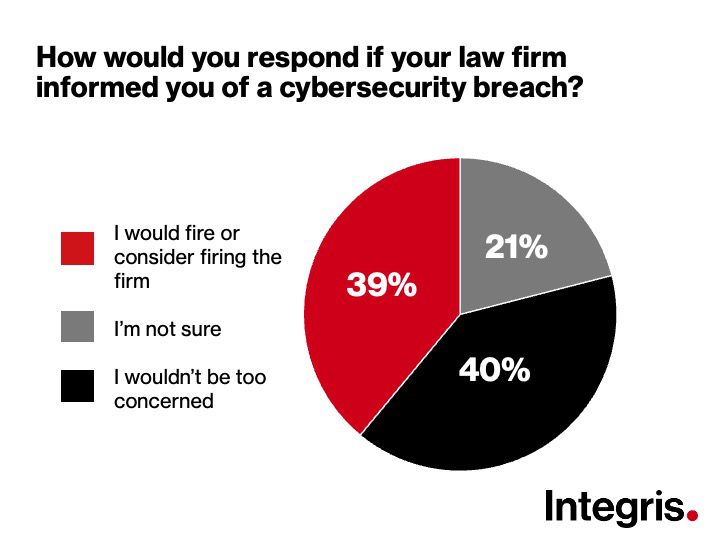 When it comes to their data, clients aren’t just looking for legal expertise; they’re looking for a commitment to security.
When it comes to their data, clients aren’t just looking for legal expertise; they’re looking for a commitment to security.
The Integris survey found that 52% of clients have concerns about cybersecurity breaches, including 8% who have previously experienced at least one breach.
Nearly 40% of clients say they would fire or consider firing a firm that experienced a breach, and 37% said they would tell others about their experience to warn them.
This is more than a red flag; it’s a mandate for firms to prove their commitment to digital safety.
The days when “trust” could be built on a firm handshake and a well-appointed office are over. Clients expect law firms to be proactive, transparent, and vigilant when it comes to cybersecurity. More than one third (36%) of respondents said they expect their law firm to proactively keep them informed about their cybersecurity practices.
Having peace of mind is so important to clients, in fact, that many are willing to pay more for it, with 37% of respondents open to premium fees if firms can demonstrate robust cybersecurity practices. This willingness to pay more speaks to a core shift in how clients define value—and for law firms, that’s an opportunity they can’t afford to ignore.
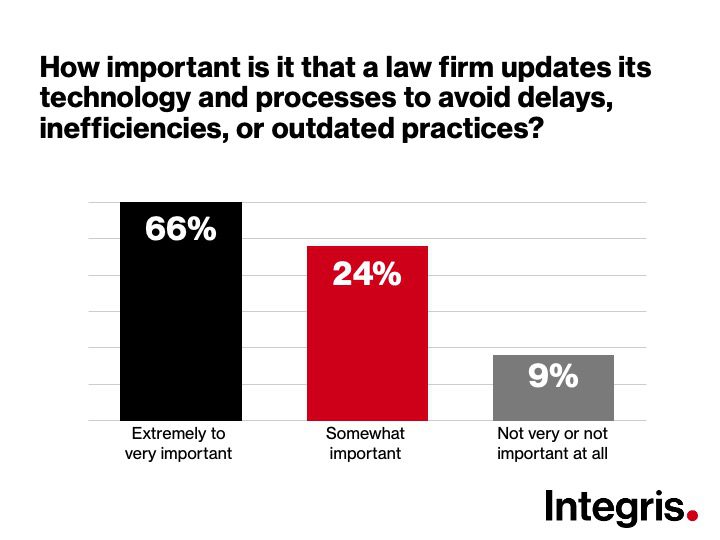
Outdated technology is driving clients away
In a world where speed and efficiency are everything, 66% of clients strongly prefer to work with firms that use the latest technology. And it’s not hard to see why.
Among survey respondents, 29% said they had experienced delays in legal services due to outdated technology or system issues, such as slow responses, lost documents or software crashes.
In a digital-first world, clients expect seamless, fast, and secure communication, not a hodgepodge of phone calls, snail mail, or unsecured emails.
For law firms, the message is clear: failing to modernize doesn’t just impact productivity—it impacts revenue. By prioritizing secure, modern communication tools, firms aren’t just protecting client information; they’re meeting client expectations and differentiating themselves in an increasingly competitive market.
“Clients expect security to be built in, not bolted on”
“Clients expect security to be built in, not bolted on,” says Greg Cooke, VP of Sales, Legal at Integris. “They want firms that embrace modern technology—not as an afterthought, but as a fundamental part of the service.”
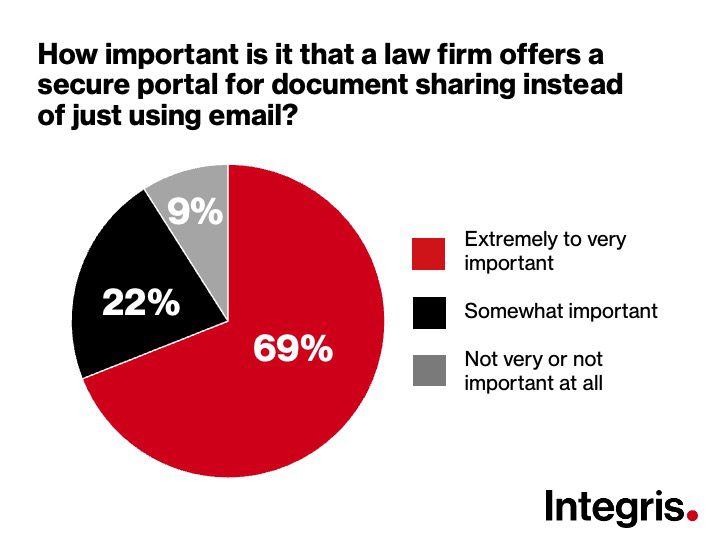
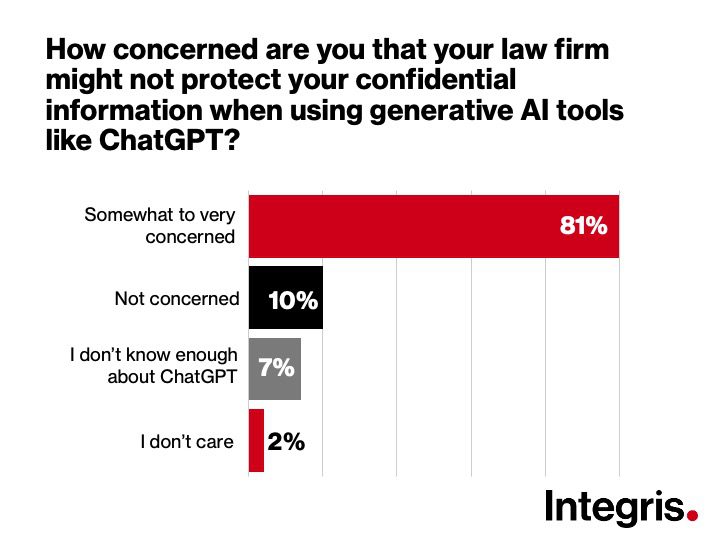
AI in legal services: caution in the courtroom
Generative AI, from ChatGPT to automated legal assistants, has made a splash in the legal industry. But with that splash comes a wave of caution.
More than 70% of clients said they would be concerned if their law firm relied “heavily” on AI tools like ChatGPT, and 81% said they were either “very” or “somewhat” concerned that their firms might not protect their confidential information when using generative AI tools.
While AI offers law firms incredible opportunities for efficiency, the majority of clients are worried that accuracy and confidentiality may be sacrificed in the process.
Clients need to know that AI is used responsibly—without compromising quality or confidentiality. That means law firms should be transparent about how and when AI tools are used, and always assure clients that AI-driven work is carefully reviewed by human experts. This reassurance could be the difference between a client’s confidence in AI-enhanced services or their decision to find a firm with a more traditional approach.
The competitive edge of IT investment
In a crowded legal market, differentiation is everything. And the Integris report reveals that cybersecurity and IT upgrades aren’t just expenses; they’re competitive advantages. When firms openly promote strong cybersecurity practices and leverage modern technology, they can gain an edge in attracting tech-savvy clients.
With 37% of clients willing to pay more for firms that market strong cybersecurity measures, law firms have an opportunity to set themselves apart by showcasing their commitment to digital trust. Highlighting certifications, third-party audits, and partnerships with top-tier cybersecurity providers can transform cybersecurity from a cost center into a client-facing asset.
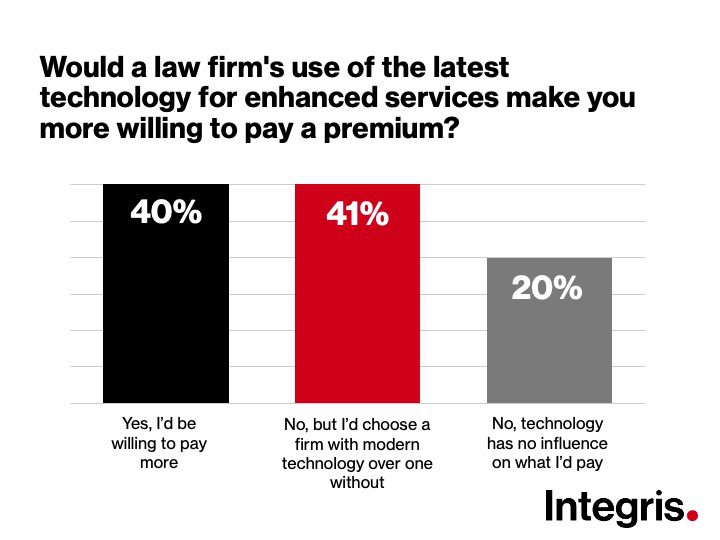
The hidden cost: what law firms stand to lose
Client Attrition
When nearly half of clients express concerns over cybersecurity and outdated technology, it’s clear that law firms are at risk of client attrition. And with 69% of clients preferring secure portals, firms that fail to adopt modern tech may soon find clients seeking services elsewhere.
Lost Revenue Opportunities
The 2025 Integris Report shows that 37% of clients are willing to pay a premium for firms with strong cybersecurity measures. That’s a significant potential revenue boost for firms willing to make IT investment a key part of their value proposition. For firms that ignore this trend, the missed revenue opportunity represents a hidden cost that could compound over time.
Competitive Disadvantage
As clients prioritize digital trust, firms that lack robust cybersecurity and technology offerings are likely to find themselves falling behind. In a market where clients are willing to pay more for peace of mind, firms that lag on IT investment may struggle to stay relevant.
Strategies for law firms to turn IT investment into client value
To stay competitive, attract clients, and build long-lasting relationships, law firms must rethink their approach to cybersecurity and technology. Here are some actionable steps based on the report findings:
Make cybersecurity a selling point
Showcase cybersecurity as a core service: Highlight certifications and third-party partnerships that demonstrate commitment to data security.
Proactively update clients: With 36% of clients expecting updates on cybersecurity practices, law firms can build trust by communicating efforts to safeguard sensitive data.
Adopt secure communication tools
Invest in secure client portals: 69% of clients prefer them, and they reduce the risks associated with unsecured email.
Simplify access while enhancing security: Offering clients a seamless, secure way to share information makes the process easy and reassures them their data is protected.
Be transparent about AI use
Disclose AI usage policies: Clients need to know if and how AI is used, and they want the assurance of human oversight.
Reinforce the human element: Emphasize that AI is a tool to support, not replace, the expertise of legal professionals.
View IT as a strategic investment
Invest in modern technology: Regularly updating technology keeps clients happy and improves internal efficiencies.
Use cybersecurity as a differentiator: With more than 1 in 3 clients willing to pay more, law firms can position strong cybersecurity practices as a unique value proposition.
Conclusion: digital trust is the new currency for law firms
In today’s world, clients are smarter, more informed, and increasingly skeptical about how their data is handled. The 2025 Integris Report makes it clear: digital trust is no longer optional. For law firms, cybersecurity and IT investment are no longer back-office functions—they’re front and center, impacting client trust, satisfaction, and willingness to pay.
Law firms that ignore these insights do so at their own risk, as the hidden costs of lost clients and revenue opportunities are likely to grow. But for those who embrace cybersecurity and technology, the future is bright. They’ll be able to attract and retain clients who value their commitment to digital trust, setting themselves apart in a competitive legal market.
Ultimately, the hidden cost of cyber neglect is a cost law firms can’t afford. By investing in secure technology, embracing transparency, and using cybersecurity as a competitive edge, law firms can not only protect their clients’ data but also create a client experience that’s worth every penny—and maybe a little more.
